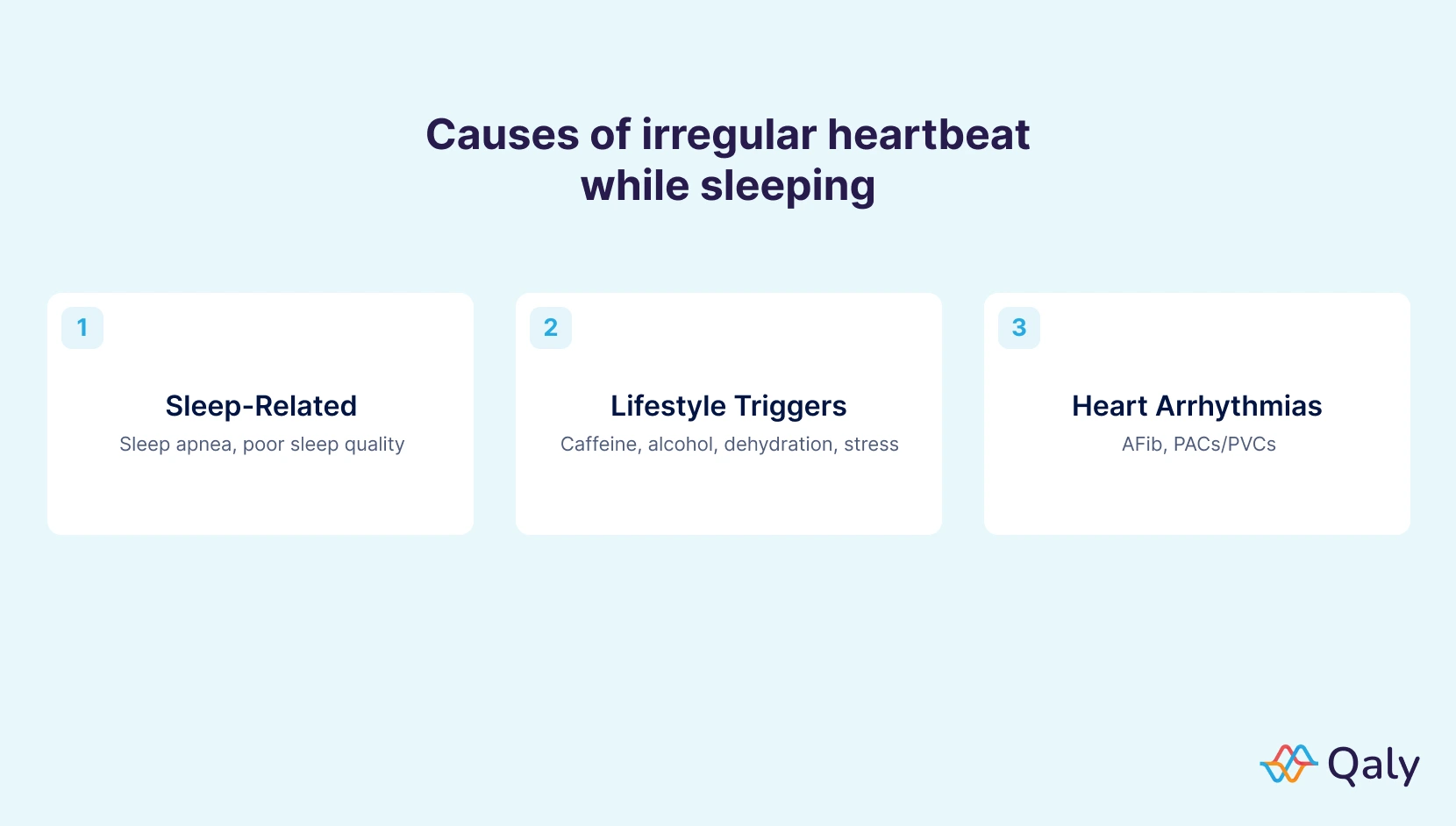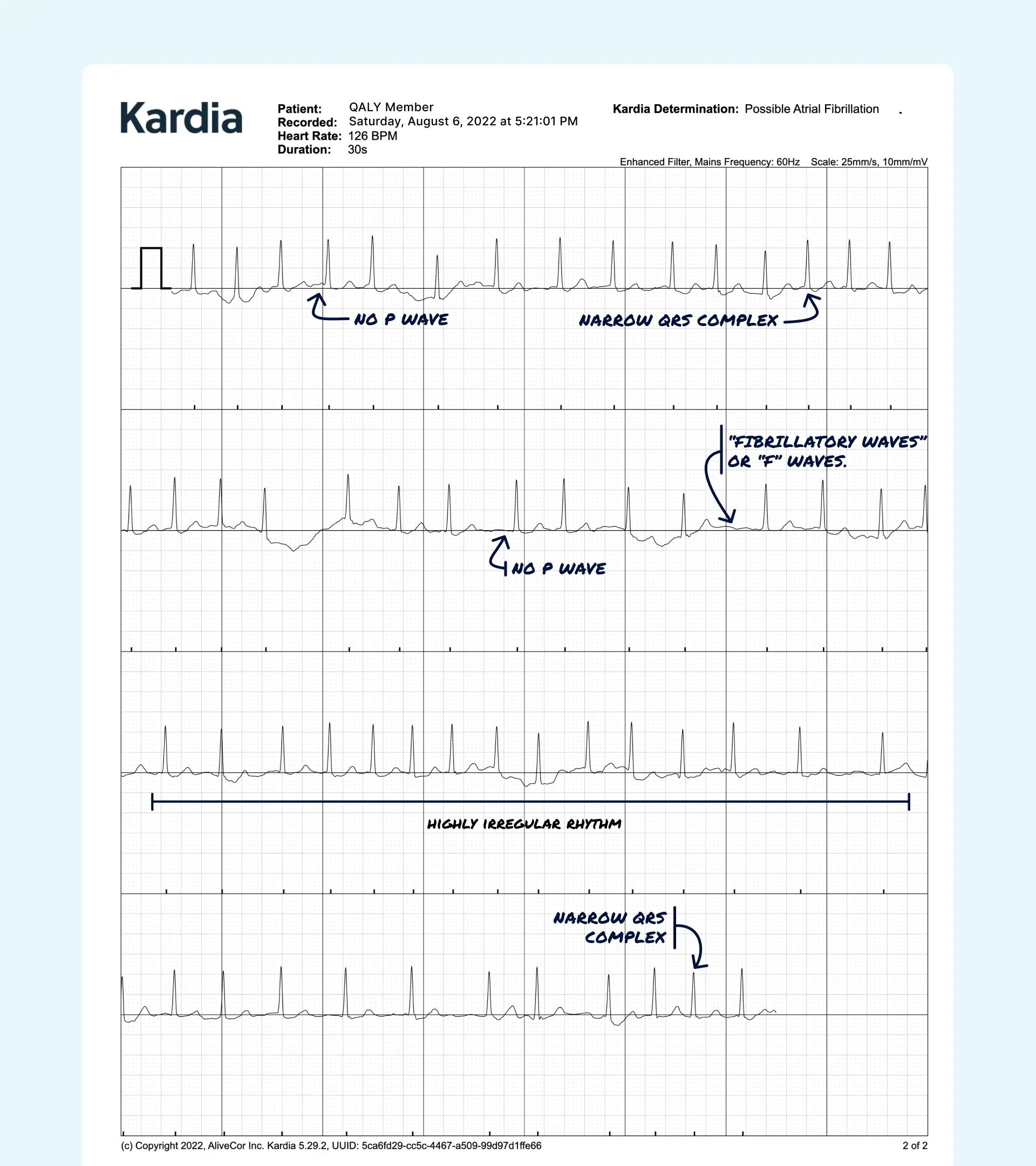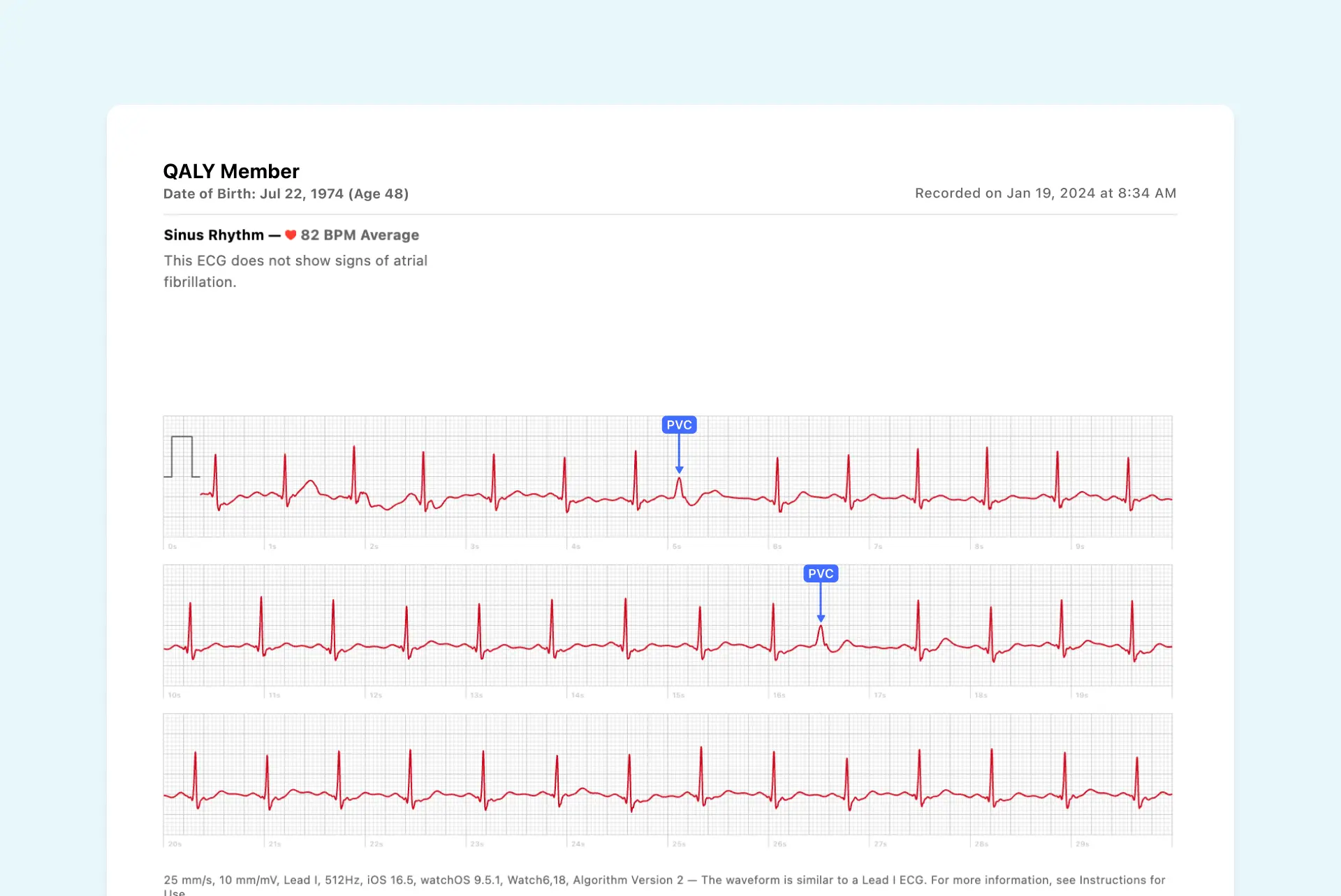Key Takeaways
Hello, heart hero. Waking up to a racing or skipping heart can be deeply unsettling. It's completely understandable to feel concerned. While an irregular heartbeat while sleeping is often harmless, it's your body's way of sending a signal that deserves attention.
Your Guide to Understanding Nighttime Heart Flutters
Feeling your heart flutter, pound, or skip a beat in the quiet of the night can be an isolating experience. You’re definitely not alone in this, and you're right to look for clear, straightforward answers.
We know how frustrating it can be to navigate the healthcare system, especially when your symptoms get dismissed or are just hard to describe. Our goal is to empower you with knowledge, helping you become an active partner in your own health journey.
This guide is your starting point for decoding what your body might be telling you. We’ll cut through the confusing medical jargon and focus on what these sensations actually mean for you.
What You Will Learn
Think of this as your roadmap to understanding your heart's nighttime behavior. We’ll walk through several key areas to give you a complete picture:
- Why Your Heart Acts Differently at Night: We'll explore the natural changes your body goes through during sleep that can make you more aware of your heartbeat.
- Common Culprits and Triggers: From lifestyle habits like late-night caffeine to underlying conditions such as sleep apnea, we'll identify the usual suspects.
- Taking Control with At-Home Monitoring: Discover how you can use modern tools like wearable ECGs to gather your own heart data, giving you concrete information to share with a doctor.
- When to Seek Professional Guidance: We’ll provide a clear guide on recognizing the warning signs that mean it's time to have a conversation with a healthcare professional.
You are the expert on your own body. Noticing these changes is the first and most important step. Our aim is to provide the context you need to understand those signals and decide on your next move with confidence.
By the end of this guide, you won't just have information; you'll have a much better handle on your own health and the tools you need to advocate for yourself effectively.
Let’s begin.
Why Your Heart's Rhythm Changes During Sleep

Have you ever wondered why your heart seems to have a mind of its own the moment you lie down to sleep? You’re not just imagining it. Your body isn't just powering down for the night; it's entering a complex and fascinating cycle that directly influences your heart’s rhythm.
Think of your body's control system (the autonomic nervous system) like the transmission in a car. During your busy day, it’s in 'drive,' keeping your heart rate up and ready for action. This is your sympathetic nervous system at work, managing your "fight or flight" responses.
But when you lie down to rest, your body shifts gears. It moves into what’s known as the parasympathetic state - the "rest and digest" mode. This shift is designed to slow everything down, including your heart rate. Your heart typically beats slower and more steadily during sleep, dropping from a daytime average of 60-100 beats per minute to as low as 40.
The Nightly Shift and Your Heartbeat
This nightly gear shift is a completely normal and healthy process. But this transition is precisely why you might notice an irregular heartbeat while sleeping. As your heart rate slows, the electrical system that controls your heartbeat can sometimes produce an extra or early beat. You might feel this as a flutter, skip, or thump in your chest.
It's also a matter of perception. The quiet of the night removes all the distractions of the day. Without the usual background noise, you're simply more attuned to your body's internal symphony, making every little beat and skip more noticeable.
It's reassuring to know that for many, becoming aware of your heartbeat at night is a result of your body naturally slowing down, not necessarily a sign that something is wrong.
The Crucial Role of Sleep Quality
While this nightly slowdown is normal, the quality of your sleep plays a huge part in keeping your heart's rhythm steady. Interrupted or poor sleep can put a real strain on your heart.
In fact, research has shown a direct link between sleep disturbances and heart arrhythmias. Individuals who frequently wake during the night have about a 26% higher likelihood of developing atrial fibrillation (AFib), a common type of irregular heartbeat. Similarly, those with insomnia face a 29% higher risk compared to sound sleepers. You can learn more about the research linking poor sleep to AFib.
This connection highlights just how important restful sleep is for your cardiovascular well-being. Understanding this interplay between sleep and heart function is the first step in figuring out what your body is trying to tell you when it sends those nighttime signals.
Common Conditions Behind Nighttime Heart Flutters
Now that we know how sleep itself can throw your heart's rhythm for a loop, let's dig into some of the usual suspects behind an irregular heartbeat while you're sleeping. While many of those nighttime flutters are perfectly harmless, some can be your body's way of telling you something more is going on.
Think of an arrhythmia like a skilled drummer suddenly losing their beat. Most of the time, they might just miss a single tap and get right back on track. But other times, the rhythm can get chaotic for a bit longer. Knowing the potential causes isn't about creating worry - it's about giving you clarity.
The infographic below gives you a bird's-eye view of the primary drivers behind these nighttime rhythm changes.

As you can see, it's often a mix of lifestyle habits, sleep-specific issues, and existing heart conditions that contribute to what you're feeling at night.
Atrial Fibrillation (AFib)
One of the most well-known arrhythmias is Atrial Fibrillation, or AFib for short. Picture the top two chambers of your heart, the atria, beating in a steady, coordinated rhythm. With AFib, they just quiver or "fibrillate" chaotically.

This mess of signals leads to an irregular and often rapid heartbeat. This disorganized rhythm can feel much more obvious at night when your body is quiet and there are fewer distractions.
Premature Contractions (PACs and PVCs)
Ever felt a sudden "thump" or a "skipped beat" sensation in your chest? You've likely just experienced a premature contraction. These are simply extra, early heartbeats that can pop up in either the upper chambers (Premature Atrial Contractions, or PACs) or the lower chambers (Premature Ventricular Contractions, or PVCs).

While they can feel pretty alarming, the occasional PAC or PVC is extremely common and usually nothing to worry about. It's when they start happening frequently that they deserve a closer look. You can learn more about how a smartwatch can help spot them in our guide on detecting Premature Atrial Contractions with a smartwatch ECG.
A key takeaway is that not all irregular beats are created equal. An occasional flutter from a PVC is very different from the sustained, chaotic rhythm of AFib. Understanding the type of arrhythmia is the first step toward understanding its significance.
The Powerful Link to Sleep Apnea
One of the strongest culprits behind nighttime heart arrhythmias is sleep apnea. This is a condition where your breathing repeatedly stops and starts while you sleep. Every single time you stop breathing, the oxygen level in your blood plummets.
This drop in oxygen is like a panic button for your body. It gets flooded with stress hormones, causing your blood pressure to surge. This puts a massive strain on your heart, making it a major trigger for arrhythmias like AFib.
Just how strong is the link? Well, Atrial Fibrillation is the most common chronic arrhythmia out there, affecting millions in the US alone. And research has found a huge connection with sleep-disordered breathing. One study showed the incidence of AFib was almost 23% in people with central sleep apnea, compared to just 7.5% in those without it. This really drives home why tackling sleep quality is so critical for heart health.
Lifestyle Triggers That Can Disrupt Your Heart's Rhythm
Sometimes, the source of an irregular heartbeat while sleeping isn’t some complex medical condition, but a simple part of your daily routine.
Figuring out these triggers is empowering because it puts you in the driver's seat. By making small, mindful adjustments, you can often bring a sense of calm back to your heart's rhythm.
It’s really about identifying what you can control today to feel better tonight. Let’s take a look at some of the most common lifestyle factors that can unsettle your heart while you rest.
Common Culprits in Your Daily Routine
Think of these triggers as buttons that can be accidentally pressed, temporarily throwing off your heart's natural beat. Being aware of them is the first step toward avoiding them, especially in the hours leading up to bedtime.
- Late-Night Caffeine: That afternoon coffee or evening tea might be the culprit. Caffeine is a stimulant that can take hours to leave your system, making your heart more prone to extra beats long after you’ve finished your cup.
- Alcohol Before Bed: A glass of wine might feel relaxing, but alcohol can actually disrupt your sleep and irritate your heart's electrical system. This "holiday heart syndrome" can trigger arrhythmias like AFib even in people without prior heart issues.
- Dehydration: Your heart is a muscle that relies on a proper balance of electrolytes like potassium and sodium to function correctly. When you're dehydrated, this delicate balance gets thrown off, making palpitations more likely.
- Stress and Anxiety: A stressful day doesn't just disappear when you close your eyes. High levels of stress hormones like adrenaline can linger in your system, keeping your heart on high alert and causing it to race or skip beats.
Making the connection between your daily habits and your nighttime heart flutters gives you a powerful tool. It allows you to become your own health detective, finding patterns that you can change.
The Critical Role of Sleep Habits
Beyond what you consume, how you sleep is just as important. Poor sleep hygiene can be a significant trigger for an irregular heartbeat.
Things like inconsistent sleep schedules or exposure to blue light from screens before bed can disrupt your body’s natural rhythm.
Research has consistently shown that sleep duration itself is crucial. For instance, sleeping fewer than six hours a night has been linked to a significantly higher risk of developing atrial fibrillation.
How to Monitor Your Heart Rhythm at Home
It's one of the most frustrating feelings in the world: you know something is off with your heart, but when you try to explain it to a doctor, the words just don't do it justice. Taking control of your own health data can be one of the most powerful things you can do. Let’s walk through how you can use the tools you might already have to monitor your heart, right from home.
It all starts with turning those fleeting, hard-to-describe sensations into solid information. Imagine walking into your doctor's office and showing them exactly what that "flutter" from last Tuesday looked like. The conversation instantly changes. You're no longer just describing a symptom; you're a partner presenting data.
Turning Your Smartwatch into a Health Ally
Many of us already wear a powerful health tool on our wrists. Smartwatches from Apple, Samsung, Fitbit, and others now pack some impressive ECG (electrocardiogram) technology. This means you can capture a snapshot of your heart’s electrical activity the very moment you feel an irregular heartbeat while sleeping or during your day.
This is a true game-changer. Instead of waiting and hoping a monitor in a clinic catches an event, you can record it as it happens. These single-lead ECGs are fantastic for picking up on common arrhythmias.
Making Sense of Your ECG Data
Okay, so you’ve captured an ECG. Now what? Looking at the squiggly lines and numbers can feel like trying to read another language. A simple "inconclusive" or "normal sinus rhythm" result from your watch might not tell the whole story, especially if you still feel like something isn't right.
This is where specialized services come in, bridging the gap between raw data and real understanding. They help turn those confusing squiggles into clear, actionable insights you can actually use.
The goal of at-home monitoring isn’t to diagnose yourself. It’s to gather high-quality information so you can have a more informed, productive conversation with a healthcare professional.
Services like Qaly are built for exactly this purpose, connecting you with certified technicians who analyze your smartwatch ECGs and help you understand what they mean.
Here’s an example of what an interpreted ECG report can look like. It gives you far more detail than a standard smartwatch notification ever could.

A report like this breaks down your heart rhythm into specific, easy-to-understand metrics. It gives both you and your doctor a much clearer picture of what’s going on, helping to spot subtle issues that might otherwise be missed.
Recognizing the Warning Signs and When to Seek Help
Listening to your body is probably the most important skill you have, and knowing when to act on its signals is crucial. While many cases of an irregular heartbeat while sleeping are just harmless flutters, certain signs definitely warrant a conversation with your doctor. This isn't about causing alarm - it's about being prepared and proactive with your heart health.
The key is to pay attention to what else is happening in your body when the palpitations show up. A flutter on its own is one thing, but when it teams up with other symptoms, your body might be trying to tell you something important.
Think of it like the "check engine" light in your car. A single, steady light might just be a faulty sensor, but when it starts flashing and you hear strange noises and see smoke, you know it's time to pull over immediately.
Symptoms You Should Not Ignore
If your nighttime heart palpitations come with any of the following symptoms, it’s a clear sign to seek medical advice. Don't just brush them off as "anxiety" or something you have to live with.
- Severe Dizziness or Lightheadedness: A strong sensation that you might faint is a significant warning sign.
- Shortness of Breath: If you’re struggling to catch your breath while resting, it could mean your heart is working too hard.
- Chest Pain or Discomfort: Any feeling of pressure, tightness, or pain in your chest should always be taken seriously.
- Fainting (Syncope): Losing consciousness, even for a moment, requires an immediate medical evaluation.
Remember, you are your own best health advocate. Trust your gut. If something feels genuinely wrong, it's always better to get it checked out for your own peace of mind.
It can be tough to figure out exactly when a palpitation is worth a doctor's visit. The symptoms above are clear red flags, but even frequent, annoying flutters are worth bringing up. To help you prepare for that conversation, check out our guide on when to see a doctor for heart palpitations for more detailed advice.
Your Questions About Nighttime Heartbeats, Answered
If you're trying to figure out what’s going on with your heart, it's natural to have a few questions. Here are some clear, straightforward answers to the common concerns we hear about an irregular heartbeat while sleeping.
Can Anxiety Cause an Irregular Heartbeat While Sleeping?
Yes, absolutely. Anxiety and stress are huge triggers for heart palpitations. When you feel anxious, your body is flooded with hormones like adrenaline, which can easily ramp up your heart rate and cause those frustrating skipped beats.
This physical response doesn't just switch off when you close your eyes. It can hang around while you're asleep, especially if you went to bed feeling wired or you wake up from a stressful dream. Many people find that simple relaxation techniques before bed (like deep breathing or meditation) can go a long way in calming both their mind and their heart.
Is It Normal to Feel Your Heart Beat When Lying Down?
For a lot of us, yes, it's completely normal. When you lie down, particularly on your left side, your heart is physically closer to your chest wall. This simple change in position can make you much more aware of its steady rhythm.
Think about it: in a quiet room with no other distractions, your own heartbeat can suddenly sound a lot louder. That said, if this sensation is new for you, feels unusually forceful, or shows up with other symptoms, it’s always a good idea to mention it to your doctor. It’s worth it for the peace of mind.
Are All Irregular Heartbeats During Sleep Dangerous?
No, not at all. Many of them are completely benign. Those occasional flutters or skipped beats, often called PVCs (Premature Ventricular Contractions), are incredibly common and usually tied to everyday things like caffeine, stress, or just being tired.
The real difference often comes down to the pattern and persistence. A random, isolated flutter feels very different from a sustained, chaotic rhythm that leaves you feeling unwell.
However, if the irregular rhythm is persistent or happens very frequently, it could point to a more significant condition like Atrial Fibrillation (AFib). This is especially true if you’re also feeling dizzy or have chest discomfort. The only way to know for sure what you're dealing with is to get it properly checked out.
Ready to turn your smartwatch ECGs into clear, understandable insights? Qaly provides human-expert analysis of your readings in minutes, giving you the clarity and peace of mind you deserve.










.png)
.png)